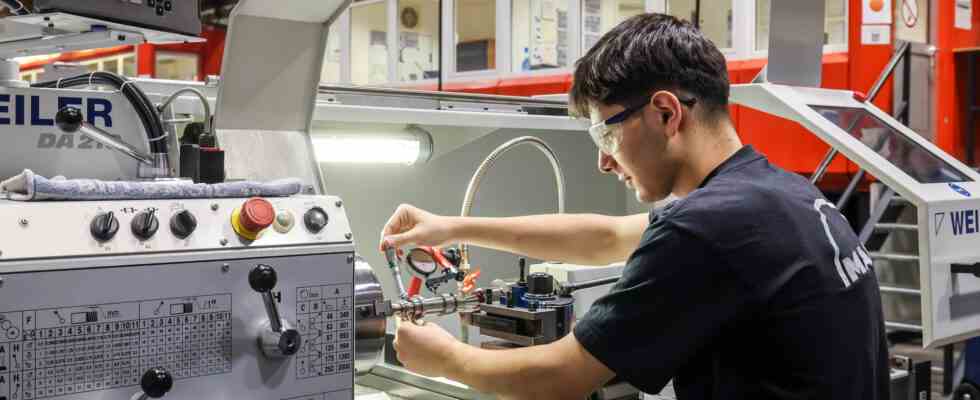Status: 08/18/2022 2:22 p.m
According to the DIHK, more than a third of all companies were unable to fill all of the training positions offered last year – more than ever before. The shortage of applicants is also a consequence of Corona.
The search for suitable trainees is apparently more difficult than ever for German companies. Last year, the proportion of companies that could not fill all vacant apprenticeship positions grew to 42 percent, as shown by a current survey of around 15,000 companies by the Association of German Chambers of Industry and Commerce.
The shortage of trainees is “an all-time high”, commented the deputy DIHK general manager Achim Dercks. “It has never been more difficult for companies to find trainees.” This shows how much the corona pandemic has further aggravated the situation on the training market.
Things are going better for service providers
For comparison: In 2018, the share of companies was still 32 percent. Industry, excluding the construction industry, recorded a particularly strong increase in vacancies from 33 to 50 percent. However, more and more apprenticeship positions are also remaining vacant in the hospitality industry (56 to 67 percent) and in transport and logistics (40 to 54 percent). Only in the case of business-oriented services has the situation remained at least unchanged compared to 2018 (26 percent each). “The need for professionally qualified people is now higher than for academics,” said the DIHK expert.
The main reason for the unfilled training places is that there are more and more often no applications at all. This applied to 36 percent of cases last year and 30 percent in 2018.
Consequences become a problem for companies
Dercks also attributes the fact that the gap between training offers and young people who are looking for a training position has widened further to the restrictions imposed by the corona virus: because this has made career orientation, career advice and the search for a training place much more difficult. The careers advisers from the employment agencies no longer came to the schools, training fairs and internships had to be canceled completely. “This has increased the disorientation of many young people,” said Dercks.
The companies are aware of the importance of professional orientation. You and the chambers had already developed new digital formats during the pandemic in order to cushion the lack of offers from schools and employment agencies as best as possible.
The consequences of the lack of trainees are serious for many companies: opening hours have to be reduced, orders rejected and services outsourced. An attempt is being made to master the lack of young talent with increasing digitization. In view of the difficult situation, the DIHK is also in favor of easier immigration.
Enough young people for Deutsche Bahn
But one company cannot complain about not having enough trainees: Deutsche Bahn. More young people than ever have applied there for the new training year starting September 1st. 115,000 applications were received, 15 percent more than two years ago, said DB HR Manager Martin Seiler: “A total of 5,200 young people are to start their training, studies or qualifications in the DB Group this year. That’s a record.”
Seiler said that the good balance of applications was due to Deutsche Bahn’s “positive employer image” and “innovative and creative personnel recruitment”. DB abolished cover letters for apprenticeships in 2018 to make applications easier. Deutsche Bahn offers around 50 apprenticeships and 25 dual study programs.

